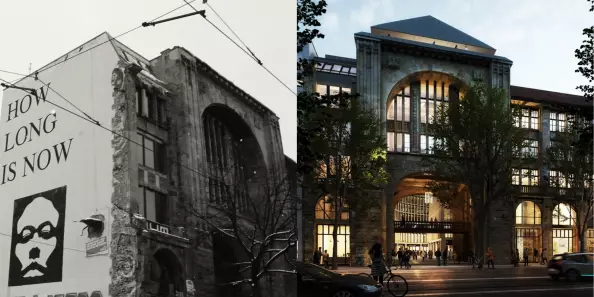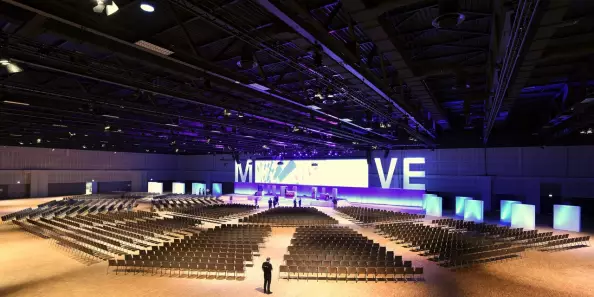Top 5 historical event locations in Berlin
Berlin stands as a dynamic city, constantly evolving while preserving its deep ties to history. The city's commitment to revitalizing historic buildings has transformed them into modern and versatil...
Special incentives, meetings and congresses need special settings. Berlin’s architectural diversity offers event planners a wealth of choice of outstanding venues – from Renaissance magnificence to baroque palaces, and from industrial charm to Bauhaus functionality.
In Berlin’s event calendar, we have already underlined two highlights with our extra thick marker pen – the Bauhaus centenary and the 30th anniversary of the fall of the Wall. Not only did the years when Bauhaus was founded and the Wall fell both mark dramatic shifts in Berlin’s history, but they also ushered in deep-rooted architectural changes. The architecture embodying those changes can be found all across the city – in very many different buildings. Yet nonetheless they have a common denominator. They share that quality so aptly characterising Berlin – recounting urban stories and histories, and creating the edgy designs attracting everyone’s gaze. They are projection surfaces for ideas and innovations. Whether they evoke enthusiasm or bewilderment, they are always part of Berlin’s buzz. And they are popular as distinctive venues for meetings, incentives, congresses and events. From art nouveau vaults to industrial heritage or Bauhaus design – through Berlin’s radical and innovative changes, the city’s architectural landscape can offer all the right settings for exceptional events!
Renaissance arches, baroque facades and rococo glitz – anyone in Berlin looking to welcome guests to the kind of royal reception once reserved for kings and queens can find a magnificent selection of locations at the Prussian Palaces and Gardens Foundation Berlin-Brandenburg. Charlottenburg Palace is ranked as one of Berlin’s most attractive venues. Going back to 1699, the palace complex includes an Orangery, Mausoleum and Belvedere as well as the beautiful garden and grounds. In its day, the Grunewald Hunting Lodge, which dates from 1542, was just as popular for royal relaxation as Frederick the Great’s renowned eighteenth-century Sanssouci Palace in Potsdam. The Jewish Museum Berlin is an impressive event location bridging the centuries, offering exclusive event facilities in the baroque old building from 1735 as well as a modern event space in the light-flooded atrium designed by Daniel Libeskind.
Around one hundred years later, the Imperial Postal Museum in Berlin opened its doors. Its legacy includes the magnificent Wilhelminian building, home to today’s Museum for Communication, now the world’s oldest postal museum – an impressive historical event location in the heart of Germany’s capital.
Our tip: Other venues also offering a trip back in time through the nineteenth century include the Arminius Market Hall, the Hotel de Rome, the RADIALSYSTEM V – Berlin’s first pumping station – and the Church of the Holy Cross.
In the early twentieth century, following Germany’s rapid industrialisation, Berlin’s urban landscape changed dramatically. The first electric tram took to the rails in Berlin’s Moabit district, while world-renowned scientists and scholars taught and researched in the city’s universities and institutes. The city attracted Nobel laureates, artists and inventors, and soon Berlin had advanced to become one of the world’s most modern metropolises. The Langenbeck-Virchow-Haus, built in 1915, is home to professional medical associations as well as a congress centre with modern facilities. Here, event organisers can give their guests a taste of the spirit of research of those days – the ideal location for scientific congresses or medical meetings and events.

The industrial heritage site of the Wasserwerk pumping station also combines tradition and modernity. The event areas, comprising 1000 sq. metres, provide a remarkable setting still retaining its historical and industrial charm. Aside from the pumping station, Berlin’s other locations from this period include converted classic brewery buildings such as the Malzfabrik, the BrewDog DogTap Berlin and the Kindl Centre for Contemporary Art as well as the red-brick building of the Asanta, a former church complex and now an event location.
This year marks the Bauhaus centenary – and, as a cultural and social centre for many leading figures in Bauhaus, Berlin is one particular focus of the celebrations. Many of those at Bauhaus came to Berlin, from Walter Gropius, founder and first director of Bauhaus, to Mies van der Rohe and Bauhaus Master Johannes Itten. They played their part in taking Berlin, always a capital of events, into the modern era and were decisive influences on its architectural development and legacy. On an insider tour with a Service Partner, event planners and guests can gain an insight into Berlin’s most important Bauhaus sites. For your meetings, incentives, congresses or conferences, venues such as the bcc congress centre – with a total of 10,000 sq. metres of event area – or the Pullmann Berlin Schweizerhof hotel give you that authentic Bauhaus feel.

Our tip: Berlin also offers innumerable options and locations for an event entirely in the 1920s style – more details here: meetings and conventions in the 1920s style.
In the post-war years, while architect Hans Scharoun designed the Hansa quarter in West Berlin, the architectural projects in East Berlin included the grand main artery of Stalinallee (now Karl-Marx-Allee) with its monumental neoclassical buildings in the Soviet style. Later in the 1960s, in marked contrast, very different architectural styles were used at the showcase Alexanderplatz and vicinity for new buildings including Kosmos, the Cafe Moskau and the Berlin TV Tower. An event here not only offers your guests a special insight into East German architecture, but also an impressive 360° panorama out across Berlin from the viewing platform set at 200 metres up Germany’s tallest building.
Berlin is renowned as one of the world’s cities forging the future. In such spectacular event locations as the foyer of the Radisson Blu Hotel, home to the AquaDom, the world’s tallest free-standing cylindrical aquarium, or in the AXICA Convention and Congress Centre, you can literally find space for tomorrow’s perspectives and ideas. Incidentally, the Axica impresses its guests with the futuristic architecture of Frank O. Gehry and an alternative spatial design for new conference formats.

And while on the topic of architecture – the Tempodrom, often dubbed unique, spectacular and visionary both in its exterior and interior design, offers the potential for a wide diversity of uses and formats for up to 3,500 guests.
Looking for the right location for your event? Need an input of ideas and inspiration for a special event in Berlin? Then just contact us at convention@visitBerlin.de and take a look at our Meeting Guide Berlin with its range of conference hotels and outstanding locations for all requirements. We support your location search and planning!
Bauhaus only existed for 14 years. Bauhaus only existed for 14 years.
Yet this school of design, art and architecture, founded by Walter Gropius in Weimar in 1919, changed the world through its visionary ideas, modern designs for living and daily life, and by fusing art and craft skills.
For the centenary celebrations, the Bauhaus cities of Weimar, Dessau and Berlin are staging a series of special events.
You can find an overview of all the events here: Berlin modernism

Berlin stands as a dynamic city, constantly evolving while preserving its deep ties to history. The city's commitment to revitalizing historic buildings has transformed them into modern and versatil...

Berlin is one of the leading congress locations with its impressive and large event halls with space for thousands of visitors and can keep up with the rest of the world. In Berlin, spaces know no b...